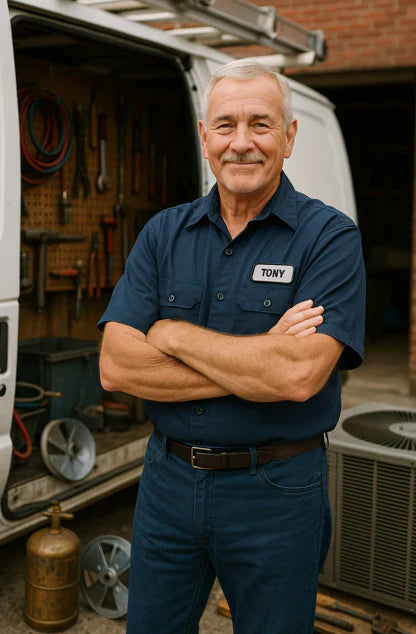🤔 Wondering if a Carrier AC cover is worth buying? In this blog, Tony the Trusted Tech breaks down when it’s smart to use an air conditioner cover (Carrier or not), how to pick the right one, and why sometimes—leaving it uncovered is the better move.
Let’s Clear the Air: Do You Need a Carrier AC Cover?
👋 Hey folks—Tony here, your neighborhood HVAC guy who’s worked on more air conditioners than most people have changed oil filters. Today we’re tackling a question I get every fall:
⁉️ “Should I buy a Carrier AC cover to protect my outdoor unit?” ⁉️
Fair question. Nobody wants leaves, snow, or bird nests messing with their investment. So let’s walk through when using an air conditioner cover Carrier makes sense—and when it could actually do more harm than good.
What Is a Carrier Air Conditioner Cover, Anyway?
A Carrier AC cover is exactly what it sounds like: a fitted or universal vinyl or polyester cover that goes over your outdoor condenser unit during the off-season. These are especially marketed to homeowners who want to protect their systems in the winter.
Now to be clear: this applies to all brands, not just Carrier. Goodman, Lennox, Trane—you name it. The idea is the same. But the results? That depends on how you use it.
When an Air Conditioner Cover Helps
There are situations where an air conditioner cover (Carrier brand or generic) makes a lot of sense.
✔️ You Live in a Region With Heavy Snowfall
If snow piles up on your outdoor unit and then melts into the coil, that moisture can refreeze and crack aluminum fins. A breathable top cover that only shields the unit’s top from snow can help reduce that risk.
✔️ You’ve Got a Lot of Trees Nearby
Leaves, twigs, and seeds falling into the top of the unit can block airflow and rot over time. A mesh-style top cover can keep junk out while still letting moisture escape.
✔️ You Want to Keep Out Curious Critters
Rodents and insects love nesting in a warm, protected condenser during the off-season. A well-fitted cover can help keep them out—but only if you also keep the area weed-free and clean.
When a Cover Can Do More Harm Than Good
Here’s the part most folks don’t expect: covering your AC can actually trap moisture, leading to mold, corrosion, and even electrical damage. I’ve seen customers use thick vinyl tarps that turn their unit into a greenhouse all winter long—bad idea.
❌ Don’t Use a Full Plastic Cover Unless It’s Vented
The outdoor unit is designed to survive rain, wind, and snow. Fully covering it seals in moisture, which can corrode your coils and wiring.
❌ Don’t Use Covers in Mild Winters
If you live in areas like Texas, Arizona, or parts of California, your unit doesn’t need protection from snow—and you might need it for heating (if you’ve got a heat pump). Covering it is just asking for trouble.
What Type of Carrier AC Cover Should You Use?
If you decide to get one, here’s my advice as a tech:
| Type | Pros | Cons |
|---|---|---|
| Mesh Top Cover | Protects from debris & snow | Doesn’t stop pests |
| Breathable Full Cover | Good for snow climates | Can trap moisture if not vented |
| Vinyl Tarp | Cheap & waterproof | Worst option – traps humidity |
Look for breathable, UV-resistant polyester with venting flaps, like this Covermates Mesh AC Cover.
Want a Better Option? Keep Your System Clean and Efficient
Truth is, if you're running a high-efficiency system like the 2.5 Ton 14.5 SEER2 Goodman R-32 AC System, you're already ahead of the game. This system is:
☀️ Designed to handle outdoor exposure with a durable louvered coil guard
🔋 Uses R-32 refrigerant, which is not only efficient but reduces the system's environmental footprint
🤫 Runs quieter and more efficiently than older systems—no gimmicks, just solid engineering
If you keep it clean and clear (no leaves, no mulch too close, no pests nesting around it), you may not even need a cover.
💭 Final Thoughts from Tony 💭
Listen—if a Carrier AC cover gives you peace of mind during the winter, go for it. Just make sure you’re not trapping moisture inside or blocking airflow. Use a top cover or a breathable full unit cover, and steer clear of plastic tarps.
But if you’ve got a reliable, modern system like the 2.5 Ton Goodman R-32 system, you’re already ahead. These units are built to last in tough conditions—just give them a little routine care and they’ll treat you right for years.
Still unsure? Ask your local HVAC pro or give The Furnace Outlet team a shout. They know their stuff and won’t push you toward something you don’t need.
🛠️ From my toolbelt to your thermostat, stay comfortable,
-- Tony the Trusted Tech 🛠️







